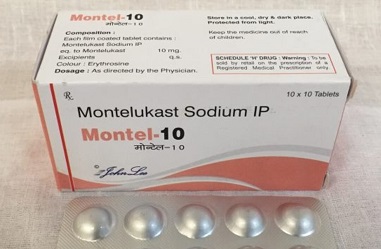U.S. Silico And Vitro Study Finds That Montelukast Might Be A Inhibitor Of New SARS-CoV-2 Omicron Variants And Sub-Lineages!
Thailand Medical - COVID-19 - Montelukast - Omicron Jul 06, 2023 2 years, 7 months, 1 week, 16 hours, 56 minutes ago
Previous Studies Already Showed Montelukast Efficacy In Treating COVID-19
Thailand Medical: Montelukast, a drug commonly used to treat asthma, may hold promise as an inhibitor of the new SARS-CoV-2 Omicron variant and sub-lineages, according to a recent silico and vitro study conducted by researchers from Texas A&M University-USA.

The research builds upon previous studies that have demonstrated the efficacy of montelukast in treating COVID-19. The findings open up new possibilities for repurposing existing drugs to combat the evolving global pandemic.
Previous news coverages by
Thailand Medical News and studies showed that montelukast could also be repurposed treat COVID-19 infections.
https://www.thailandmedical.news/news/indian-study-adds-more-evidence-that-the-asthma-drug-montelukast-singulair-can-inhibit-sars-cov-2-replication-and-is-a-potential-covid-19-drug
https://www.thailandmedical.news/news/indian-study-adds-more-evidence-that-the-asthma-drug-montelukast-singulair-can-inhibit-sars-cov-2-replication-and-is-a-potential-covid-19-drug
https://www.frontiersin.org/articles/10.3389/fphar.2020.01344/full
Observational clinical trials had also showed the efficacy of montelukast in resolving symptoms and preventing disease severity or risk of mortality from COVID-19.
https://www.tandfonline.com/doi/abs/10.1080/02770903.2021.1881967
https://www.sciencedirect.com/science/article/pii/S1567576921010481
https://classic.clinicaltrials.gov/ct2/show/NCT04718285
The ongoing COVID-19 pandemic has posed a significant threat to public health and the global economy. Coronaviruses, a group of enveloped RNA viruses, have caused several outbreaks in recent years, including the SARS-CoV, MERS-CoV, and SARS-CoV-2 strains. The latter, responsible for the COVID-19 pandemic, has resulted in millions of deaths worldwide. The emergence of new variants, such as the Omicron strain and its new sub-lineages, has further complicated efforts to control the spread of the virus.
Vaccines have been developed and approved for COVID-19 prevention, but there is still a need for effective antiviral treatments. Drug repurposing, the practice of using existing drugs for new indications, offers a viable strategy until s
pecific antivirals are developed. In this study, researchers focused on the spike receptor-binding domain (RBD)-ACE2 protein interaction, a crucial step in virus entry into host cells.
Using computational methodologies, including molecular mechanics and machine learning tools, the study team identified two FDA-approved drugs, montelukast and telmisartan, as potential disruptors of the SARS-CoV-2 spike RBD-ACE2 protein interaction. Montelukast is commonly used to treat asthma, while telmisartan is used to manage hypertension. These findings suggest an additional potential use for these drugs as antivirals.
The study demonstrated that both montelukast and telmisartan can inhibit not only the wild-type SARS-CoV-2 strain but also the Omicron variant, without reaching cytotoxic concentrations. This novel finding fills a gap in the existing literature and highlights the potential of repurposing these drugs to target SARS-CoV-2 variants.
The research employed a comprehensive computational workflow to screen FDA-approved drugs targeting the SARS-CoV-2 spike RBD-ACE2 interaction. Through molecular docking and intermolecular interaction analyses, the researchers identified ten potential inhibitors, including montelukast and telmisartan. These drugs showed significant interactions with critical residues at the interface of the RBD and ACE2 proteins.
The study's findings provide crucial insights into the structural and mechanistic aspects of the drug molecules' binding to the ACE2 molecular recognition site of the RBD. The analysis revealed hydrogen bonding and hydrophobic contacts between the drugs and key residues of the RBD and ACE2 proteins.
While previous studies have reported the efficacy of montelukast and telmisartan against the wild-type SARS-CoV-2 strain, this study is the first to investigate their efficacy against VOCs, specifically the Omicron variant. The results offer valuable knowledge for developing targeted treatments against emerging variants and contribute to the ongoing efforts to combat the COVID-19 pandemic.
In conclusion, the study findings highlight the potential of montelukast, an asthma medication, as an inhibitor of the SARS-CoV-2 Omicron variant. The findings demonstrate the importance of exploring drug repurposing strategies to address the evolving challenges posed by the pandemic. By leveraging existing drugs, researchers can expedite the development of effective treatments for COVID-19 and contribute to the global response to the ongoing crisis. The next logical step would involve large randomized clinical trials to test the efficacy of montelukast against the various newer Omicron sub-lineages.
The study findings were published in the peer reviewed journal: pharmaceutics.
https://www.mdpi.com/1999-4923/15/7/1891
For the latest on COVID-19, keep on logging to
Thailand Medical News.
